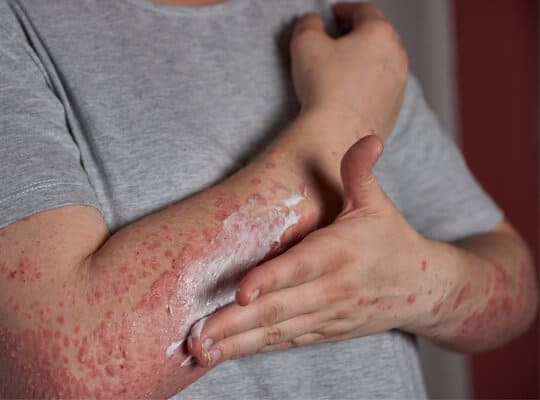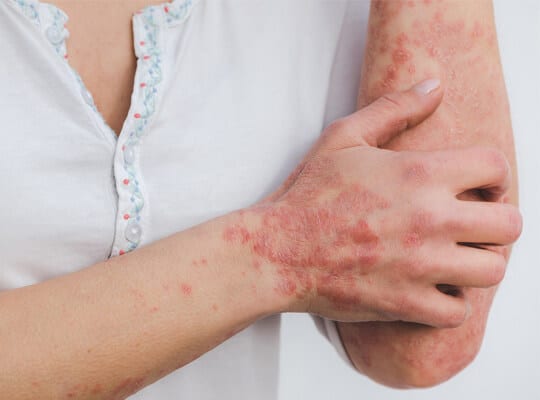Living With Psoriasis
Table of Contents
Living With Psoriasis
Psoriasis is a chronic skin condition that causes scaly, red patches to appear on the scalp, elbows and knees. It can also affect your nails and genitals, though these areas are less common. Psoriasis doesn’t just affect the skin – it can also cause joint pain and inflammation of internal organs such as your liver, spleen and lungs.
What is Psoriasis?
Psoriasis is a chronic skin disorder that causes red, scaly patches to appear on the skin. It can be itchy and painful.
Psoriasis affects about 2% of the world’s population, but it’s not contagious. The exact cause of psoriasis isn’t known, but it may be related to an overproduction of skin cells or an immune system response (called inflammation) to these cells.

What are the Causes of Psoriasis?
There are a number of factors that can contribute to the development of psoriasis. These include:
- Genetics: Psoriasis is a genetic condition, meaning that if you have close relatives with the disease then you are more likely to develop it yourself. It’s not uncommon for members of the same family to share similar symptoms or even have identical types of psoriasis.
- Environmental Factors: Psoriasis can be triggered by exposure to sunlight (UV rays) and/or extreme temperatures like heat waves or cold weather conditions; however, even these factors don’t always lead directly to developing psoriasis. Other external triggers include smoking cigarettes or drinking alcohol excessively (which can make existing symptoms worse).

How is psoriasis diagnosed?
If you think you may have psoriasis, it’s important to see a dermatologist for an accurate diagnosis. A dermatologist is a medical doctor who specializes in skin conditions like psoriasis and other rashes. Your doctor will begin by performing a thorough physical examination of your body, looking for signs of psoriasis. He or she will also ask about your medical history, family history (genetics), and lifestyle factors that might be contributing to the problem.
Blood tests can help rule out other conditions that may cause skin problems such as diabetes or thyroid disease; however blood tests aren’t always necessary unless there are other symptoms besides the rash itself (for example if someone has severe itching).
What are the Symptoms of Psoriasis?
Psoriasis is a skin condition that causes red, scaly patches of skin to appear. These usually itch and are often painful to the touch. Psoriatic arthritis is similar to rheumatoid arthritis and can cause problems with your joints, especially if you have psoriasis on your hands or feet.
The symptoms of psoriasis vary from person to person but they may include:
- Flaky red patches on the scalp, elbows and knees (common)
- Raised areas of skin covered in silvery scales (less common)
- Itchy patches of skin that come and go over time (rare)
How to Treat Psoriasis?
There are various ways to treat psoriasis. Here’s a look at the different options:
- Topical therapy, which includes creams and ointments that you apply directly to your skin. These medications can clear up patches of psoriasis by helping your body produce new skin cells faster than it does when you have psoriasis. They also help reduce inflammation in the affected area, reducing itching and soreness associated with the condition.* Phototherapy (light therapy), which is used to treat mild-to-moderate plaque psoriasis on regions such as the scalp or palms of hands.* Oral medications taken by mouth that may be helpful for treating milder cases of plaque psoriasis but are less effective against other types of this condition.* Biologic therapies–such as Enbrel (etanercept), Humira (adalimumab) and Remicade (infliximab)–which target specific parts of your immune system so they don’t overreact to normal cells in healthy areas such as joints or organs.

4 ways to control psoriasis
There are many things you can do to control the symptoms of psoriasis. Here are five of the best:
- Use a moisturizer. The dryness caused by this condition can make your skin itchy and flaky, so it’s important to keep your skin well hydrated with moisturizers like lotion or cream.
- Wear loose clothing that won’t rub against your skin or irritate it further. This might mean swapping out those tight jeans for sweatpants, or opting for long-sleeved shirts instead of short-sleeved ones (if you’re able to).
- Exercise regularly–not only does exercise help build muscle tone in general but also helps improve circulation throughout the body which will reduce the redness associated with psoriasis flare-ups!
- If possible try not go outside during peak sunlight hours because UV rays from sunlight can worsen symptoms too much sunlight exposure may also lead towards development of other conditions such as melanoma cancerous growths affecting pigmentation cells within epidermis layer (top layer) .
If you have psoriasis, it’s important to know what causes it and how to treat it.
For More Information
Please do not hesitate to contact us for more information on the subject.



